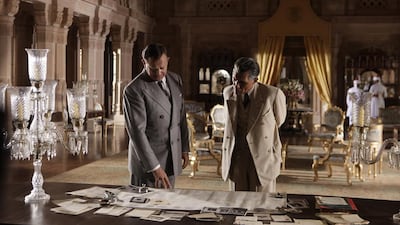Viceroy’s House
Director: Gurinder Chadha
Starring: Hugh Bonneville, Gillian Anderson and Huma Qureshi
Three stars
The partition of India and Pakistan in 1947 is a wound that is yet to heal. Discussions on the partition continue to result in strong opinionated reactions, so perhaps it is not surprising that popular Hindi cinema has largely avoided it.
Even before Viceroy's House was released, Fatima Bhutto, a Pakistani writer, was slamming the film in The Guardian with director Gurinder Chadha quick to reply. And all this in a film that is trying so hard not to offend.
The most famous film that deals with partition remains the Oscar-winning biopic Gandhi. Its success led to a cycle of films and television shows about the British Raj in the early 1980s such as Heat and Dust, The Jewel in the Crown, The Far Pavilions and A Passage to India.
Some 70 years after partition, British-Asian director Chadha offers a different perspective, one told through the eyes of the British. Perhaps not such a surprise given that many of Chadha's films — Bhaji on the Beach and Bend It Like Beckham — are told from the perspective of the perceived "outsider".
The film starts with the Winston Churchill quote “History is written by the victors”. The suggestion is that Chadha, whose family was forced to move from the village of Jhelum in what is now Pakistan because of partition, will offer a new perspective.
Taking her lead from Narendra Singh Sarila's book The Shadow of the Great Game, Chadha casts Churchill as a Machiavellian puppet master who sends Lord Mountbatten to India because he is sure he will fail to keep the union together.
Viceroy's House takes a long time to arrive at this intrigue as Chadha's history lesson is written from the perspective of a wily filmmaker who wants to capitalise on the success of British period dramas such as Gosford Park and Downton Abbey.
The format sees the politicians describe the great game, while the servants have to cope with the effects of their decisions.
The need to entertain and introduce an audience not so well-versed in the history of India seems to be a priority, and while Chadha’s film is entertaining, there are so many characters and perspectives that the film inevitably suffers from reductionism.
Too many cooks spoil the curry. The political leaders, Nehru (Tanveer Ghani), Jinnah (Denzil Smith) and Gandhi (Neeraj Kabi) are characters with singular ambitions.
The romance between a Hindu servant (Manish Dayal) and his Muslim counterpart (Huma Qureshi) is not given enough airtime to truly resonate, while oddly there is not even a hint of the rumoured tryst between Nehru and Lady Mountbatten (Gillian Anderson, who is excellent).
Chadha manages to pull at the heartstrings, entertain and provide a historical perspective in a film that demands to be seen, and most importantly, discussed.
* Kaleem Aftab

